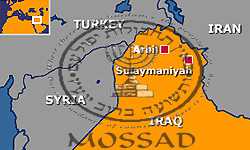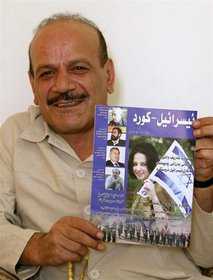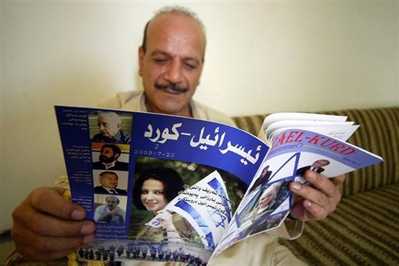By Andy Turpin
Mirror-Spectator Staff
LEXINGTON, Mass. — In anticipation of the House of Representatives’ Res. 252 to recognize the Armenian Genocide, members of the greater Boston Armenian and Jewish communities have formed an Armenian Jewish Coalition (AJC) and presented an online petition to garner support for the immediate passage of the resolution.
Lexington resident and Armenian National Committee (ANCA) member Laura Boghosian is the co-chair of the AJC alongside Rabbi Howard L. Jaffe of Lexington’s Temple Isaiah.
“It started with Rabbi Jaffe and myself and I brought in Dikran Kaligian [ANCA Eastern Region chairman] and we began a Steering Committee,” Boghosian said. “Most of the members who are from the Jewish community are from Temple Isaiah but crucial to helping us are Senior Rabbi Ronne Friedman and Rabbi Elaine Zecher of Temple Israel of Boston.”
She explained, “From the Armenian community I wanted to cast a wide net. Involved in the coalition right now are Ruth Tomassian [executive director] from Project SAVE, Marc A. Mamigonian [director of programs and publications] from NAASR [the National Association for Armenian Studies and Research] and Sona Petrossian from the Newton Human Rights Commission.”
“It started with a dialogue group and we had a series of three meetings where we broke into discussion groups. Most of the Jewish community members thought there was not enough education about the Armenian Genocide and not enough known about its history amongst the Jewish community,” she added.
As for the coalition’s timeline she noted, “We started in the spring of 2008 and the meetings went through November. The outcome was that we should have some kind of Action Committee to come out of the group. The dialogue group itself was a reaction to the 2007 controversy of the Anti-Defamation League’s denial of the Armenian Genocide in its ‘No Place for Hate’ program school curriculums.”
Boghosian prasied Jaffe’s staunch support for the coalition, adding, “He felt that recognizing the Armenian Genocide was the right thing to do and I really appreciated that because he was motivated to act on his principles.”
She added that, “In May of 2008 during their Shoah [Holocaust] commemoration ceremony, they invited the Armenian community and Armenian historian Richard Hovanissian to speak about the parallels between the Holocaust and the Armenian Genocide, after which [Prof.] Henry Theriault spoke to the temple’s men’s group about the impact of denial.”
Boghosian said the AJC’s petition is the first of the groups actions to be publicly undertaken. “The coalition is important because it demonstrates there’s a grassroots effort in the Jewish community to recognize the Armenian Genocide and a core belief by both sides that human rights, not political expediency, need to govern US foreign policy,” she said.
Another AJC member, Herman Purutyan of the Armenian Assembly of America, said of his involvement in the group, “I see this collaboration not ending here but continuing to raise awareness of the denial going on and I think other efforts will come forth in the future from this after the petition.
“I think I personally bring into the conversation the Armenian Assembly’s participation through my own relations with that group. Although the Assembly is not a formal participant in the coalition, they have formally endorsed the petition,” he added.
Jaffe stated that in 2007 he was largely unaware of the complexities and far-reaching scope of the denial of the Armenian Genocide by Turkey and the events’ power over aspects of various geo-political relations, noting, “I had no idea of the entrenchment of this issue in the politics of Jewish organizations.”
He explained that to his surprise, “I actually found out through mutual friends that my remarks in favor of the ADL were offensive to those in the Armenian community and Laura Boghosian and others in the Armenian community helped educate me more on the subject. It was a very important encounter on both sides.”
Speaking about Temple Isaiah’s inclusion of members of the Armenian community into its 2008 Shoah commemoration, Jaffe said that, “as a result of that relationship we brought in Richard Hovannissian to speak about the history and dynamics of the Armenian Genocide and its denial. That was unprecedented for us since most of our speakers on that occasion and in the
Temple are exclusively Shoah related, and he spoke beautifully. A substantial number from the local Armenian community around Lexington attended the commemoration as well.”
Jaffe went on to say that the Armenian Genocide recognition and education issue, “was very important to me and continues to be and there’s still an active amount of healing that needs to be done between the local Armenian and Jewish communities after the events of the ADL and the ‘No Place for Hate’ separation.”
As for the next steps to be taken by the AJC in their grassroots campaign to further the cause of Armenian Genocide recognition Jaffe stated, “Future efforts are indefinite at this point. We in the Jewish community are taking our cues from those activists in the Armenian community that really are more educated on the issues of what needs to be done next.”
He added, “We’ve been officially ignored by the mainstream Jewish organizations, many of which continue to deny the Armenian Genocide. This is unfortunate because the larger organizations need to take on this issue, especially because there are those in the Jewish community to which it really matters.”




 TEHRAN (FNA)- The US and Israeli spy agencies are trying to promote evangelism in Iraq’s Kurdistan region, sources said.
TEHRAN (FNA)- The US and Israeli spy agencies are trying to promote evangelism in Iraq’s Kurdistan region, sources said.



